How Gifts Grant Candidates Power
By Lauren Bonilla, on 31 August 2016
This blog is the fourth in a series of posts about Mongolia’s 2016 parliamentary elections that were held on June 29th.
Lauren Bonilla and Tuya Shagdar co-authored this blog. It is based on our collaborative research on the social life of political gifts and cash transfers in the Mongolian economy. We are currently writing a larger journal article on this topic and will present our research at the Emerging Subjects project workshop to be held at the National University of Mongolia on November 15th, 2016.
According to Mongolia’s election law, parliamentary candidates are permitted only 18 days to campaign prior to the day before Election Day. A short campaign period is meant, in theory, to curb excessive campaign spending and reduce the pre-election politicking fatigue of citizens. In practice, however, the campaign season extends well before the 18 days. For months before the parliamentary election, aspiring candidates employ an array of novel and costly tactics to attract public attention and support, notably though the giving of gifts.
In May, we (Tuya Shagdar and Lauren Bonilla) travelled to the geographic fringe of Mongolia in north-western Uvs province to study parliamentary election politics and rumours of gift-gifting before the official campaign period was set to begin. It was a heated time for us to be doing research on the elections. We learned this immediately when we arrived in the capital of Uvs, Ulaangom. When we attempted to snap photos of the Democratic Party (DP) headquarters and the fleet of slick black Land Cruisers parked outside of it, a man in his twenties working for the party ran towards us and aggressively questioned what we were doing. After warning us not to take photos and calming down a bit, he said to us, “You know what kind of period it is, right?” (Yamar uye baigaag medej baigaa biz dee).
Gifting in a Time of Crisis
Actually, for many people in Uvs the heat of the elections began to blaze after the beginning of the fire monkey lunar year in February. Astrologists predicted that it was going to be one of the coldest and snowiest winters in Mongolia’s recent history, and this turned out to be true in Uvs. Herders struggled to keep livestock alive as temperatures dropped below 40 degrees Celsius and deep snow prevented livestock from accessing pasture. The physical, psychological, and financial effects of the harsh weather event, known as a dzud, were compounded by the absence of cash following a season of poor meat sales.
This difficult period provided an opening for aspiring parliamentary candidates to strategically make themselves known to both voters and to the political party they sought a nomination.[1] Everyone we talked with in Ulaangom and a rural district in Uvs, Bokhmoron, talked about the “assistance” (tuslamj) that they or people in other districts received from individuals vying for a position a parliament.
The assistance families received was more than mere aid. Take, for instance, the packages that Odongiin Tsogtgerel of the Teso Group distributed throughout rural Uvs. Teso is a nationally-recognized food import and manufacturing company named after a district in Uvs (Tes) and run by a family originally from there. The company distributed an estimated 30,000 MNT (around USD $13) worth of prepacked noodles and rice to households throughout the province. On a number of occasions families hosting us prepared soups using the Teso products they received. Perhaps they valued the food items and reserved them for special guests, or maybe they thought that we, unlike them, would actually enjoy eating carrot-infused processed noodles.
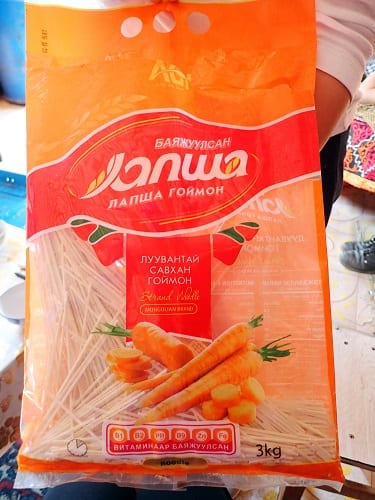
Teso’s AGI brand carrot-infused Lapsha noodles given as part of the dzud assistance package. Photo by Lauren Bonilla.

Man in Bokhmoron making us soup with the noodles he received in his dzud assistance package, even though he is not a herder who lost animals during the harsh winter. Photo by Lauren Bonilla.
Just as every household had a bag of Teso foodstuffs from the assistance package in their cupboard, they also all had a Teso calendar hanging in their home. The calendar came with the package and promoted the Teso brand. Each month featured a different Teso business venture like imported Russian ice cream and mine drilling. The bottom of every page featured the image and profile of the President of the company, Odongiin Tsogtgerel. In May, the DP publically announced Tsogtgerel as one of its two parliamentary candidates for Uvs.
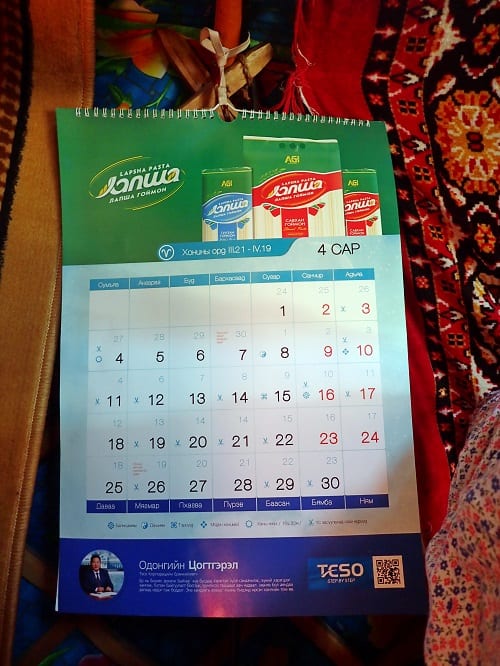
Teso calendar given as part of the dzud assistance package. April features the Lapsha noodle products given to households in Uvs. Photo by Lauren Bonilla.
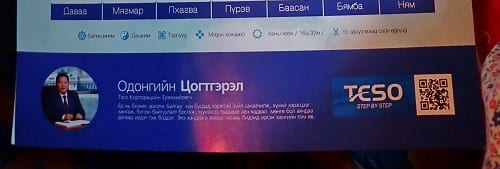
Ondongiin Tsogtgerel, President of Teso Corporation: “In general if you are an entrepreneur who has new ideas to provide to the needs of others and if you are enjoying the work you do, the money will follow through. This is what I inherited from our father.” Photo by Lauren Bonilla.
Including a calendar in the assistance package many months prior to being publicly announced as a candidate was a clever way for a businessman to promote his name and company to voters. Though the package made no reference to his political campaign or politics in general, it was absolutely a form of pre-election campaigning. Indeed, people talked about the assistance packages as gifted by Tsogtgerel, not the Teso Corporation. People appreciated that Tsogtgerel distributed the packages at the end of a harsh winter when herders were tired and low on cash to buy food staples. The packages also influenced the way that people viewed Tsogtgerel’s character. Despite his young age, the packages demonstrated that he was a “big man” (tom hun) who “does a lot of things” (ih yum hiisen). As Liz Fox described in her recent blog post, The Road to Power, being someone who has done something, not someone who says they will do something, matters greatly to Mongolians nowadays. People have become tired of promises and politicians talking about the future when so many expectations have failed to materialize. Material things – gifts – demonstrate the capabilities of a person and their potential as a political candidate.
Competing Calendars for Competing Parties
While the western calendar gifted by Tsogtgerel decorated the walls of gers, families also kept an astrological lunar calendar underneath poles holding up the ger ceiling, allowing for easy access. These small calendars are ubiquitous in the countryside and are used daily to aid decision-making about things like when to move to new pastures, make important purchases, or get a haircut.
During an afternoon lull in a family’s ger in Bokhmoron, we idly flipped through an astrological calendar, not expecting to find anything related to our research. Yet, interspersing pages about earth elements, animal days, and moon phases were political comics and commentary lambasting the last four years under the DP’s leadership. The calendar was published by a an incumbent member of Parliament belonging to the Mongolian People’s Party (MPP), Chimediin Hurelbaatar.
One of the comics depicts Hurelbaatar standing in front of seated leaders of the DP, holding a pointer to a graph and lecturing. The graph shows a sharply falling line meant to represent the downward trend of Mongolia’s economy. Hurelbaatar is shown as an MPP master teaching DP pupils that, “Without fixing policy mistakes we will not come out of the economic crisis”. The comic is also meant to recall lessons from Mongolia’s previous debt history. Hurelbaatar was one of the architects of Mongolia’s resettlement of its socialist-era Great Debt (Ikh Ör) with Russia, an event lauded as the MPP’s historic merit to the Mongolian economy. [2] Hurelbaatar’s depictions of a collapsing economy resonated with pre-election discourses about an economic crisis and rising sovereign debt burdens. He presents himself in the astrological calendar as an economic pedagogue backed by experience to address Mongolia’s major issues.
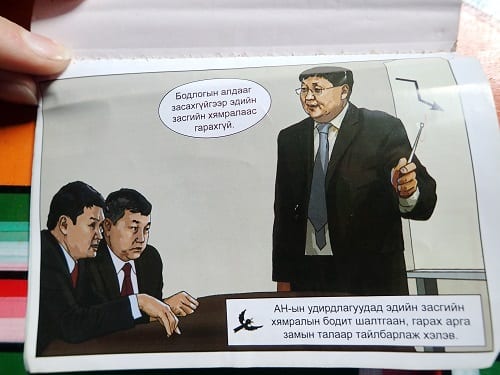
An image in the astrological calendar of Chimediin Hurelbaatar schooling the DP leaders about the economic crisis. Photo by Lauren Bonilla.
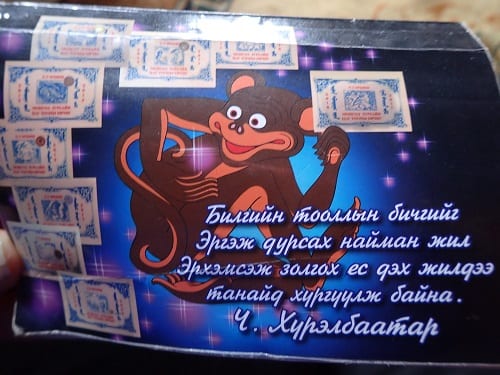
Back page of the astrological calendar distributed by Hurelbaatar for the New Lunar Year of the Fire Monkey. Photo by Lauren Bonilla.
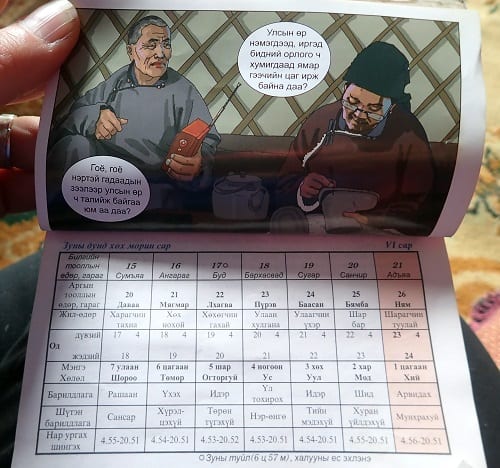
Astrological calendar detailing animal days and earth elements, as well as commentary about national external debt. Photo by Lauren Bonilla.
Like Tsogtgerel, Hurelbaatar distributed the astrological calendar as a gift to families after the Lunar New Year holiday in February. Both calendars served the same function to make the potential candidate’s name and face visible to people. However, Hurelbaatar’s astrological calendar appealed to more traditional sentiments and a past when the economy was stronger under MPP leadership. It also had direct political messaging, without specific mention of Hurelbaatar’s aspirations for another run in parliament.[3] In contrast, Tsogtgerel’s western calendar demonstrated a young, savvy, and entrepreneuring capitalist with connections in domestic and international business spheres. Ultimately on Election Day the citizens of Uvs, like the rest of Mongolia, overwhelmingly elected MPP over DP candidates.[4]
Rumours of Cash
During our Uvs visit we were interested in material things that candidates distributed to people, but we also wanted to investigate rumours of cash handouts. Most of the times when we asked about cash handouts, our interlocutors showed reserve and alarm because such activities are considered illegal by the electoral law.[5] Although responses were vague about receiving cash, people had strong convictions about cash gifts. Based on experiences during the 2012 parliamentary elections, we were told that candidates usually distribute cash in the last days of campaigning within the legally allotted 18 days. One young man admitted that he received cash and did not feel ashamed about it. He believed he was entitled to the money: “If it is offered, one should take it” (Ogoh l heregtei, ogch baigaa bol avah heregtei shu dee).
Whereas things like calendars and processed noodles were subsumed into the daily activities of people and appeared to symbolize patronage by powerful and wealthy elites, campaign cash handouts appeared to be something to be claimed, not just passively received. Moreover, the illicit discourse on cash handouts had a moral implication in a time of crisis and national debt – a topic that we will examine in a forthcoming journal article and project workshop at the National University of Mongolia on November 15th, 2016.
Gaining Visibility
When we asked people what party they planned to support in the June election, we heard nearly the same thing over and over in rural areas: “I’m voting for the person, not the party” (Nam geheesee iluu huniig ni songovol uul ni). While the unprecedented number of independent and third-party candidates may have contributed to this attitude, the highly individualistic campaign strategies of candidates certainly nurtured a politics of persona.
Gifting before the election reinforces qualities associated with a respectable leader, particularly one “who does things” (see Liz Fox’s concept of the inverted logic of the vote-return exchange). Gifts also serve the interests of the candidate by giving them visibility within the intimate sphere of households. Candidates become known to people and their names gain power. As a local official in Tariat soum in Uvs said to us, “You have to be a ‘known person’ (tanil hun), not an educated person, to get elected.”
Our research in Uvs suggests that gifts also serve citizens, and this is why they are readily accepted. Beyond the usefulness of things like calendars and noodles, the receipt of gifts during the pre-election period is a means for Mongolians to gain visibility as citizens. In contrast, after the elections everyone expects that politicians will lose interest in them and do only what matters for themselves, their businesses, and their factions.
[1] The political parties publicly nominated candidates for jurisdictions on May 28, 2016.
[2] Их Өр Үүссэн, Дууссан Түүх, Б.Пүрэвсүрэн, 2008, Улаанбаатар хот.
[3] Hurelbaatar was re-elected into Parliament. An earlier version of this blog, posted on August 31st, mistakenly wrote that Hurelbaatar did not receive his party’s nomination.
[4] Uvs is a longtime MPP stronghold in Mongolia.
[5] Article 35.15.1 of the Law on Election revised by parliament in 2011 states that it is forbidden to, “Distribute cash or free goods for voters, sell them at lower rates, provide services free of charge or at lower rates, and organize a chargeable puzzle, betting, or gambling.”
126 Responses to “How Gifts Grant Candidates Power”
- 1
-
2
nuru massage wrote on 1 July 2023:
Sutra spa treatment offer a range of benefits for both body and mind some of the advantages, Sutra massage is dedicated to providing no.1 massage in bangalore. visit body to body massage
- 3
- 4
-
5
Bella spa wrote on 5 July 2023:
It is important to research the best spas and Body massage in Bangalore before you book a body-to-body massage. Talk to your therapist about any concerns you have or areas that you would like them to concentrate on during the massage.
- 6
- 7
-
8
harry brooks wrote on 5 July 2023:
You want to get a dog, but you don’t want fur all over your furniture. Perhaps dog hair causes you to have an allergic reaction. Most dog owners will attest to the fact that their pet sheds a lot of hair, and that it may be a nightmare to get rid of. Dogs that shed excessively might be a problem for people who suffer from allergies. small dogs that don’t shed
- 9
- 10
-
11
SWEETY SPA wrote on 6 July 2023:
Erotic massage also has a variety of health benefits. The slippery gel that is used for the massage has a high moisturizing factor, which helps to nourish and hydrate the skin. The gel is also said to stimulate the lymphatic and circulatory systems, which helps remove toxins.
-
12
Assignment Help wrote on 6 July 2023:
Your post was amazing. I really enjoy to read. Thank you for sharing.
Well anyone here who is searching for Law Assignment Help? Our experienced team of legal professionals works hard to provide you with accurate, up-to-date legal information. We offer assistance with a variety of law assignment topics, from contract law to criminal law, and from torts to property law. Our team of experts will help you understand the complexities of the legal system and provide you with guidance on how to approach the assignment. - 13
- 14
-
15
슬롯사이트 wrote on 6 July 2023:
I can suggest essentially not too bad and even dependable tips, accordingly se 다시 href=”https://slotsitekor.com/”>슬롯사이트
-
16
erotic massage wrote on 6 July 2023:
Spa Leela is provide best erotic massage massage centre in bangalore and it is massage can be a transformative force that influences individuals and as a whole.
-
17
erotic massage wrote on 6 July 2023:
If you’re interested in getting a massage , it’s important to find a qualified and reputable massage therapist. and spaleela is the erotic massage centre for you, so come to our spa center and enjoy it.
-
18
erotic massage wrote on 6 July 2023:
Leela has the massage to bring joy, fulfillment, and a sense of purpose to our lives. It can inspire to freshness. visit erotic massage
- 19
-
20
Ishani wrote on 7 July 2023:
For body massage to be successful, it must be performed properly by professionals. So, our Chennai spa is your greatest option if you’re in the city and want the best massage ever. B2b Massage Discover the top beauty spas, body massage center, Female massage center, Thai body massage clinics, and male to female spas in Chennai . For body massage centre, call right now.
-
21
Attiqa Shad wrote on 9 July 2023:
Our affordable treadmills deliver the best quality and the latest technology. From exclusive interval training programs and responsive motors to easy to one-touch controls, we offer fitness solutions that work. horizon treadmills
-
22
B2B massage wrote on 9 July 2023:
The B2B massage in Chennai provide a variety of massages that will suit your specific needs. You can find the right massage for you, whether you want a Swedish massage to relax, a deep-tissue massage to relieve tension or an Ayurvedic one for holistic healing.
-
23
studying abroad benefits wrote on 10 July 2023:
studying abroad benefits is a life-changing experience that offers a multitude of benefits and opportunities for personal, academic, and professional growth. Whether you choose to immerse yourself in a different culture, pursue a specialized field of study, or gain a global perspective, studying abroad can be a transformative journey that shapes your future in countless ways.
-
24
cv writing service ireland wrote on 12 July 2023:
“Looking for a reliable CV writing service in Ireland? Look no further! Our expert writers have a deep understanding of the Irish job market and will create a high-quality CV that grabs the attention of employers. With our personalized approach, we highlight your key qualifications, experience, and achievements, maximizing your chances of success. Take the first step towards your dream job today and let our CV writing service in Ireland pave the way for your professional success.
-
25
seth Khan wrote on 13 July 2023:
Nice knowledge gaining article. This post is really the best on this valuable topic. best essay writing service reddit
 Close
Close


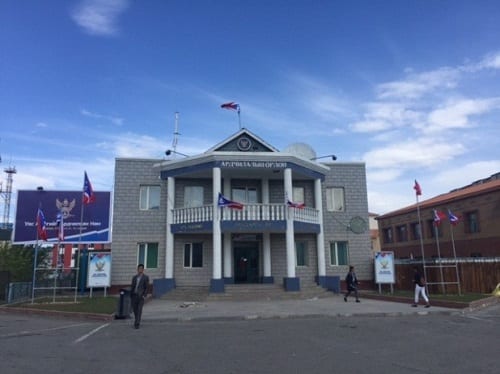


Our platform offers a convenient and easy-to-use interface, allowing you to access our services anytime, anywhere. We provide customized solutions tailored to your specific needs, ensuring that you receive the highest quality of assistance. In addition to our 24/7 support, we also offer competitive pricing for our services. We understand that students have limited budgets, and we are committed to providing inexpensive solutions that meet their needs. Our pricing formation is transparent, and there are no hidden fees or charges. We believe in providing our clients with the best value for their money.
University Homework Help is your one-stop solution for all your homework and assignment needs. Our platform offers panoramic expert biology homework assistance in various subjects, provided by a team of experienced experts who are available 24/7 to help you achieve academic success. We are committed to providing customized solutions tailored to your specific requirements at competitive pricing.